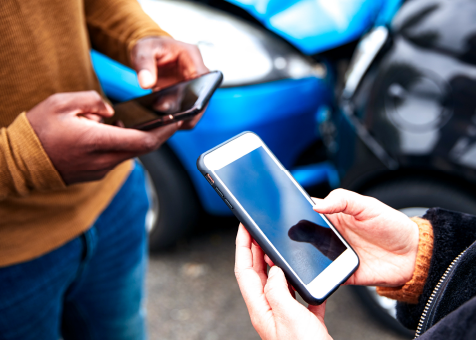How to prove a car accident wasn’t your fault

What Details to Exchange in a Car Accident
If you’ve been involved in a car accident, you’re legally required to stop and exchange your name, address, the vehicle owner’s name and address (if different from the driver), and vehicle’s registration number. Knowing what to share, why it is important, and how to comply with legal requirements will help you handle the first steps after an accident effectively.
What details to exchange in a car accident and why
Here’s a breakdown of what you should share with the other party and why. By being thorough and prepared, you can avoid unnecessary complications and focus on moving forward after the accident.
Here’s a list of the essential details you need to exchange:
What: Driver’s Name
Why: This identifies who was driving the vehicle at the time of the accident. It is important for determining responsibility and ensuring smooth follow-up communication regarding liability or claims.
What: Driver’s Address
Why: Obtaining the driver’s correct home address helps confirm the identity of the driver and provides a reliable way to contact them throughout the claim.
What: Vehicle Owner’s Name and Address (if different from the driver)
Why: If the driver isn’t the owner of the vehicle they’re driving, this information is essential for contacting the registered owner during the insurance claim process. The registered owner is typically responsible for making key decisions about the vehicle, such as repairs or total loss settlements. Examples of this are driving a leased, borrowed, or company car.
What: Vehicle’s Registration Number (Number Plate)
Why: This is the unique reference for the vehicle involved in the accident. It helps to access essential information, such as insurance details, and MOT or tax status. You can verify the details to confirm that the licence plate matches the correct registered vehicle here: DVLA Vehicle Enquiry Service
What: Insurance Policy Number and Insurance Company (if requested)
Why: This helps to ensure that any claims for damages or injuries can be filed with respective insurers. If you’re not at fault in the accident, you have the option to use an accident management company, which can handle the entire claims process on your behalf - from roadside recovery to arranging comparable replacement vehicle or managing vehicle repairs - all at no cost to you.
If the other driver doesn’t have valid insurance, it’s still important to collect as much information as possible and report the accident to the police immediately. If the driver is not insured, the Motor Insurers' Bureau (MIB) can cover personal injury and property damage caused by uninsured drivers, provided specific conditions are met.
Avoid sharing irrelevant information such as bank account details or your National Insurance Number, as these are not required.
Downloadable Accident Details Form
To make documenting important information easier, we’ve created a downloadable and printable accident details form. This form can be used at the scene to note all necessary details or printed in advance and kept in your car for future reference.
Having this form at hand helps to ensure that all required information is collected, saving you time and hassle later.
Speak to a Non-Fault Claim Specialist
We manage everything on your behalf, ensuring that the claims process is as smooth and stress-free as possible.
Back to the top >

Understanding Your Legal Responsibilities
Failing to meet your legal obligations after an incident can lead to serious consequences, whether you’re at fault or not.
Knowing When to Share Details
Under Section 170 of the Road Traffic Act, you are legally required to stop and exchange details after a car accident if any of the following conditions are met:
- Personal Injury - if any person is injured, other than the driver of the vehicle
- Damage is caused:
- to another vehicle or trailer
- to an animal that isn’t in your vehicle
- to property such as fences, buildings etc.
It doesn’t matter how minor the accident may seem, these legal requirements apply to all incidents.
If for any reason the details can’t be exchanged at the time of the accident, such as the driver fleeing the scene, the incident must be reported to the police within 24 hours.
The Risks of Potential Consequences
Drivers who fail to stop and exchange details risk fines, 5-10 penalty points on their licence, or even criminal charges.
Following the rules isn’t just a legal obligation - it’s also essential if you’re planning to make a claim.
Think Smart, Act Safe
Whether it’s protecting your personal information, identifying potential scams, or managing difficult interactions, being prepared can make all the difference.
This section provides practical advice to help you handle the possible challenges of a car accident, stay safe, and protect your rights.
Protecting Your Data in a Car Accident
It’s important to protect your personal information. Oversharing can lead to the misuse of your details and even fraud, so knowing what to share and what to avoid sharing is essential.
If someone asks for more information than what’s legally required, you can politely decline. Knowing your rights and sticking to the details required by law is enough. Make sure that you’re only providing your details to those directly involved in the car accident or the police.
Recognising and Handling Accident Scams
If anything about the accident feels suspicious, for example if you suspect it might be a ‘crash for cash scam’, it is important to stay cautious. Call the police on 999 immediately to report your concerns before sharing any personal or insurance details. Avoid engaging in unnecessary conversations, as scammers may attempt to manipulate the situation further.
Trust your instincts and always prioritise your safety.
Handling Challenging Situations After a Car Accident
In situations where the other party becomes aggressive or uncooperative, it’s important to avoid getting involved in an argument. Instead, remain calm and politely but firmly redirect the conversation back to exchanging the necessary details.
If the other driver’s behaviour escalates, becomes threatening or you suspect they may be under the influence of alcohol or drugs, call 999 immediately for assistance.
Your well-being is the top priority, and involving the police can help manage the situation effectively and safely.
Capturing Critical Evidence to Support Your Claim
Gathering evidence after a car accident will support your claim and help verify what happened, establish fault, and strengthen your position in case of any disputes, especially if you weren’t at fault. Here’s a list of key evidence to collect:
- Videos or photos showing vehicle positioning and damage
- Photos or notes of any injuries sustained
- Witnesses information and statements
- Statements from other drivers
- Weather and road conditions at the time
- Traffic signs and signals
- Date, time and location of the accident
- Dash-cam or CCTV footage, if available
- Police report (if involved)
- Medical reports related to injuries
For a detailed guide on the information and evidence to collect at the accident scene, click here.
How Auto Claims Assist Supports Non-Fault Drivers
We take pride in providing accident management services to non-fault drivers, combining expertise with exceptional customer service.
We Manage Everything
At Auto Claims Assist, we specialise in managing non-fault claims from start to finish. Our aim is to minimise the inconvenience caused to you, as the non-fault driver, so you can focus on what matters most.
Services We Offer
We offer a wide range of accident management services designed to provide a hassle-free experience for non-fault drivers. Our team handles everything, from arranging 24/7 accident recovery to managing your entire non-fault claim including your comparable replacement vehicle.
We specialise in negotiating fair settlements and ensuring that your interests are protected every step of the way.
No Cost to You
When claiming with Auto Claims Assist, there’s no cost to you as a non-fault driver. All costs are recovered directly from the at-fault driver’s insurer, removing the financial burden from you.
Why Choose Auto Claims Assist?
Auto Claims Assist provides a reliable service for managing non-fault claims. We don’t just take care of the logistics, we’re focused on making the entire process as smooth and stress-free as possible.
Our commitment goes beyond recovery and repairs, we work hard to make sure that you receive the best outcome you deserve.
By claiming directly against the at-fault driver’s insurance, we ensure there’s no impact on your own policy, no excess to pay, and no risk to your no-claims bonus.
Regulated by the FCA and rated excellent on TrustPilot, Auto Claims Assist is a trusted choice for non-fault drivers.
When you choose Auto Claims Assist, you’re choosing expertise, simplicity and peace of mind.
Speak to a Non-Fault Claim Specialist
We manage everything on your behalf, ensuring that the claims process is as smooth and stress-free as possible.
Back to the top >

Auto Claims Assist
First contact after a car accident
Start my claim online Call us on 0330 128 1407Do I have to pay excess if the accident wasn't my fault
Do I lose my no claims if the accident wasn't my fault
Will A Non Fault Accident Affect My Insurance
Accident Management VS Your Insurance Company
Complete Guide of What To Do In A Car Accident
We help thousands of drivers every year
36,000+
Successful cases
